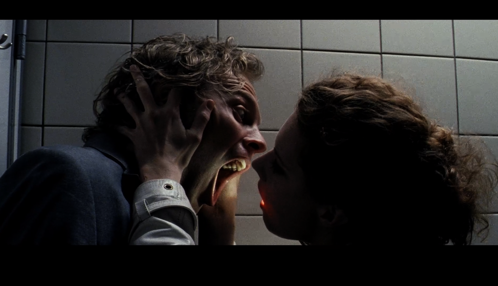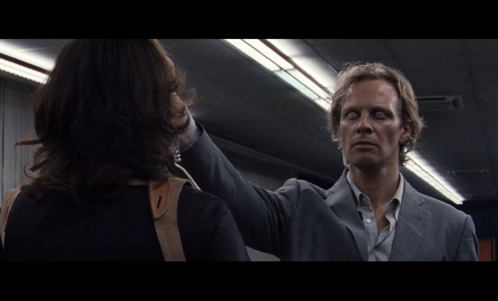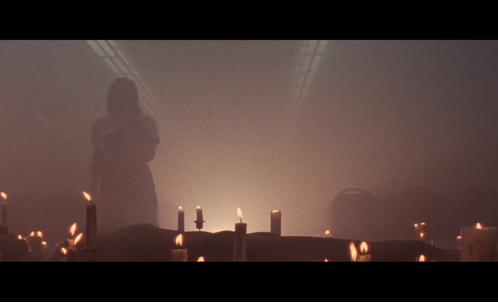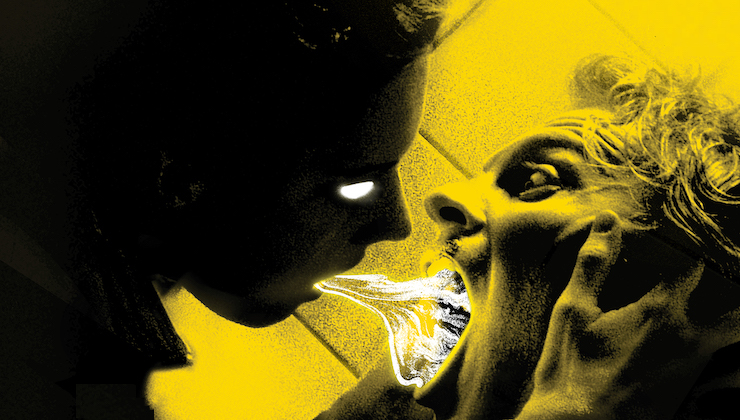sample heading
Luz, a German art-horror flick currently streaming on Shudder, is frustratingly hard to critique at times. It’s a movie structured as a nightmare, but its quick length doesn’t allow it long to sink in. It’s a deft character study, but the rather sparse plot doesn’t give them a lot to do. It’s a suspense movie, but a lot of the main suspense is undercut by having a powerful demonic presence putting everyone under their control within moments of the plot really kicking off. But while the leanness of the movie (it’s a tight 71 minutes) might undercut a little of the narrative, Tilman Singer’s ’80s Euro-horror homage manages to make the best use of every moment of screen time, delivering a strange collision between character study and lucid cinematic nightmare that delivers interesting visuals and sets out to do exactly what it wants to do in the process. While it might be sparse and unusual at times, it’s a tense and weird movie that’s definitely worth a watch, and never tries to be anything more than it is.
Luz begins with the title character, a Chilean taxi driver living in Germany, getting in a car accident and heading to a police station to file a report. The police then try to recreate the accident and find out what happened with the help of Doctor Rossini, a psychiatrist skilled in regressive hypnosis. Unbeknownst to everyone, Rossini was possessed and taken over by a supernatural entity with ties to Luz’s past, intent on finding its way back to Luz. As the police begin their interrogation, a strange game of cat-and-mouse ensues, with the possessed Rossini trying to manipulate Luz into his clutches once again.

While there’s not much to the plot, and everything takes place in maybe four sets, Luz does an incredible amount with what’s there. The regressive hypnosis sequence features an absolutely brilliant performance by Luana Velis, who mimes her way through starting her night shift as a cabbie while more details are added to the scene, giving an excellent sense of place while she moves around a police conference hall opening imaginary doors and windows, and mouthing the (dubbed-in) dialogue of the several people she meets over the course of the night. The demonic possession elements are subdued (the demon is passed through a kiss and represented by a light streaming out of someone’s mouth, its powers are a fog machine and colored contact lenses for the demon and its victims) and actually give the horror a more mundane, grounded tone to the wildly surrealist plot of demonic possession and nested hypnotic states. While the police office is workmanlike, the tension built through the use of long takes of a hallway or doors makes it feel unnerving, and the opening scene bears at least a passing resemblance in its use of mundane action and sudden emotion to the infamous jumpscare scene from The Exorcist III. It’s a fantastic use of minimalism in horror, and one that does evoke the spirit of the ’80s euro-horror it’s trying to emulate fairly well.
That surrealist tone is a boon to Luz, as well. The movie plays out as a semi-lucid nightmare even before the hypnosis kicks in, opening with an unusual conversation between Jan Bluthardt as Rossini and Julia Riedler in a hammy performance as Nora Vanderkurt, Luz’s (demonically possessed) catholic-school friend as they consume a number of increasingly gaudy drinks in between hits of their drug of choice. It establishes an off-kilter tone immediately– there’s obvious humor in the gaudy drinks and Nora’s ranting, but there’s a tension, too, some air of menace in the way she harasses Rossini into drinking with her and then continues ranting at him about Luz and her supposed psychic powers. It’s a small taste of the movie to come, which juxtaposes scenes of, say, Luz walking through a fog-shrouded room meant to be the school where she was abused in Chile with Rossini running around behind her, nude save for a black cocktail dress, trying to get in position of the next scene. The surreal humor also serves to break up the tension and make everything a little less unrelenting and overly serious, be it the odd and deadpan scene that has Rossini dressing up in Nora’s clothes during Luz’s regression, or the way the police interpreter refuses to translate Luz’s twisted version of the Lord’s Prayer into German. It’s offbeat but never out of place, never so absolutely blatant or in-your-face that it’s jarring, but just enough that it allows a slight breather from the supernatural suspense movie at its core.

Luz also does an excellent job setting up the characters. Immediately from the start you get a good idea of the demon’s obsession with Luz, Luz’s past through her bitter and blasphemous version of the Lord’s Prayer that calls out God for the various abuses of the Church, and it fills in details as it goes, exploring Luz’s psyche and allowing her to rip the mystique around her to shreds as she goes, bitterly deconstructing the idea of “the mysterious woman with a gift” and letting the audience in on her past and the pain she carries with her. That’s part of the intrigue of the movie, too, allowing this air of mystery to build up around Luz and then letting her ruthlessly take back her own identity, mocking Julia as someone prone to the powers of suggestion and showing what really happened in her cab as opposed to what the demon thought what happened, actually taking back a lot of agency that the initial setup didn’t give her. Rossini gets increasingly more unhinged throughout as the demon becomes more and more intent on getting what it wants, but never seems to break his calm demeanor throughout, leading him to become more unnerving by just how little he seems affected by his surroundings, seemingly still in control even as things descend further into Luz’s dreams. A lot of character development is done through seeming shorthand, but it does good work building the mood and tension up by letting us know who these people are through their various affectations and filling in the reasons for their actions as it goes.

Though with all this discussion about mood and tension, it’s worth noting that the one thing Luz doesn’t seem to have is narrative stakes. While there’s a bit of tension in the first meeting and Luz being hypnotized, knowing that Rossini has her in his clutches for a large portion of the movie kind of takes the air out of the tires. None of the characters also attempt to fight back all that much as things get weirder, and while there’s a very good excuse of Rossini being in control of the situation, and a brief struggle at the end when the tension reaches its peak, there just doesn’t feel like there’s much conflict to it. It’s kind of annoying that there’s no resistance, no give and take, and that while it’s definitely Luz’s movie, she’s sort of led around by the hand, in thrall to a demonic presence and not really bothering to fight back for a lot of the movie. It can be argued that the movie doesn’t need it, that its place as a lucid nightmare and sparse plot make it more of a mood piece, something to sink into and let wash over you, but it’s a bit annoying that, even at its short length, there’s not very much for the viewer to hang on to. it’s established early on who’s holding all the cards, and once the initial shock of a demon doing hypnosis wears off, there’s not a lot to follow along with as it moves from one bizarre dialogue scene to the next.
But if you’re in the market for something stylish and surreal and that plays like an odd collision of a mood piece and character study, Luz does exactly what it’s supposed to. It’s a bizarre lucid nightmare of suspense and ’80s Euro-horror homage that doesn’t overstay its welcome, has some excellent performances by its small but incredibly taut cast, and manages to mix suspense with strange humor and supernatural horror in a way that keeps things weird and fresh throughout. While the plot might be sparse and the stakes low, there’s enough there to present you with a weird and intriguing experience, and one that’s at least worth a look.



